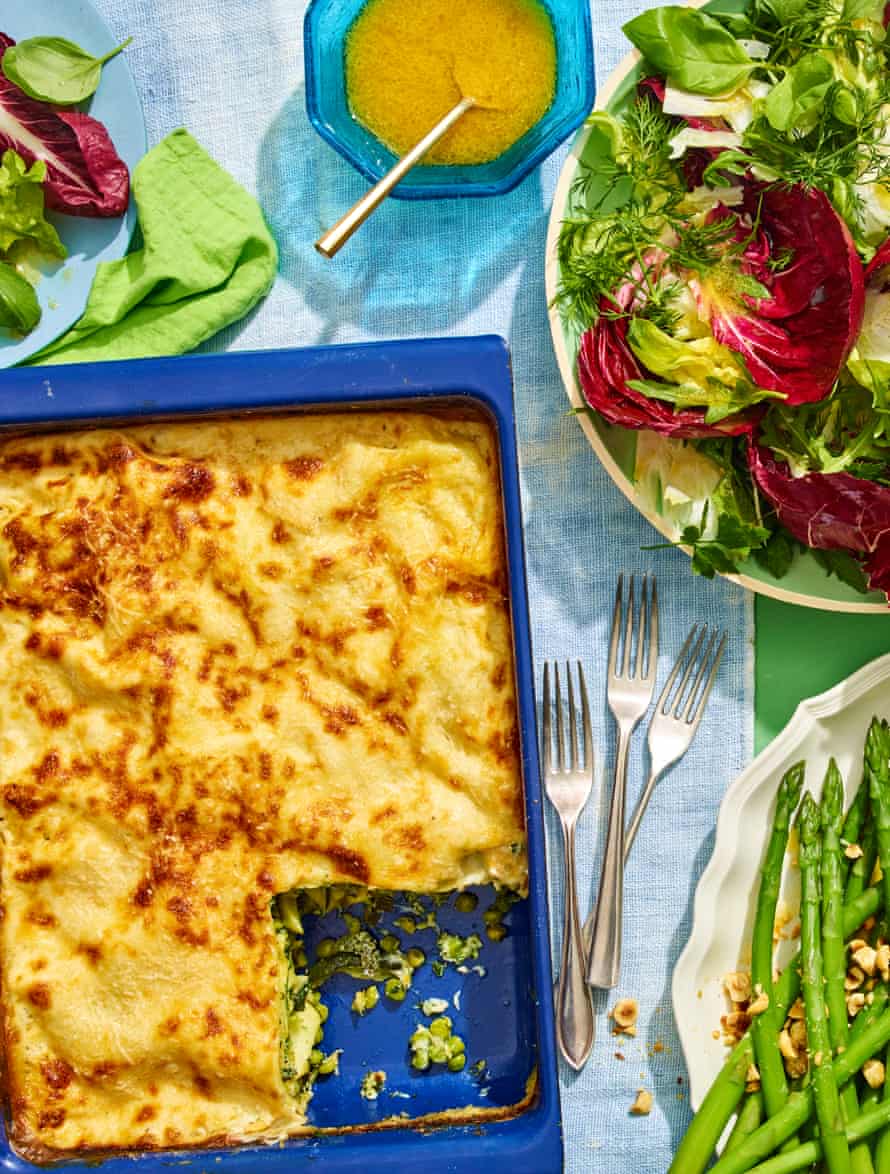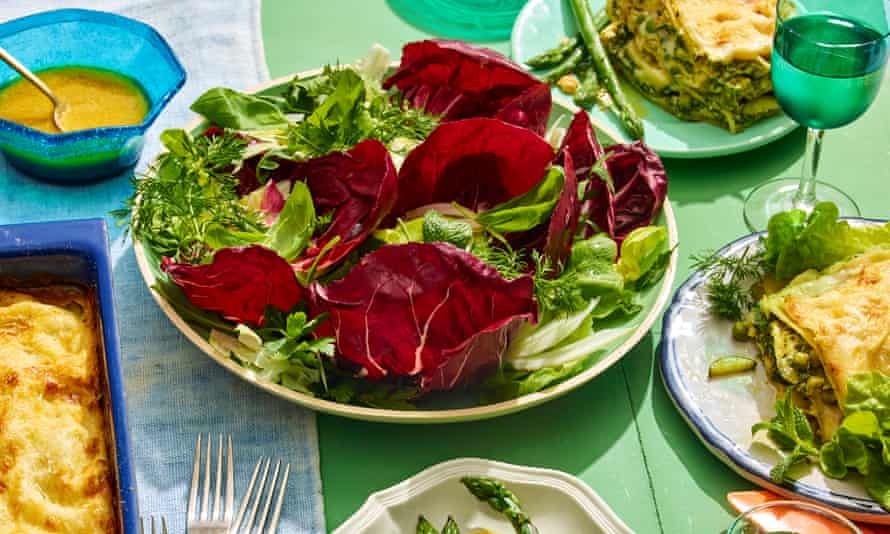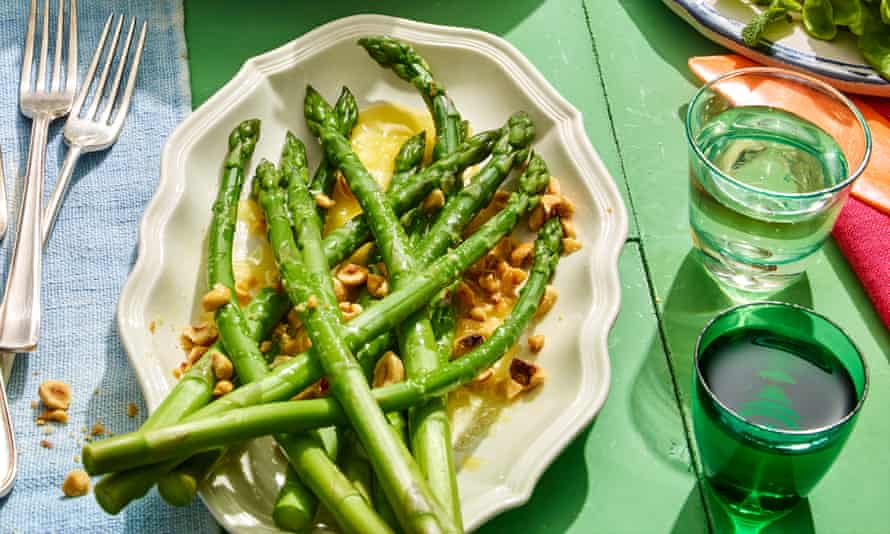
I dream of travelling at near light speed in a spaceship constructed of aluminium, titanium and semolina. My mission is to visit every galaxy in the pasta universe. The ship is also built for time travel and can move through different points over 12,000 years; it encounters the evolution of all the 1,300 pasta shapes that Oretta Zanini De Vita identified in her 2009 Encyclopedia of Pasta; also, shapes not invented yet. I eat them all, while wearing a yolk-coloured spacesuit.
Oretta’s phrase “voyage in the pasta universe”, part of the introduction that outlines her research (interviewing very old people about pasta-making traditions), was the one phrase I needed to read in the early days of writing my book about pasta. It summed up the sheer scale of the subject, the historical, geographical and cultural matter, the beauty and the black holes. Then it lightened everything, reminding me I was on a fabulous voyage wearing a yolk-coloured spacesuit (or my yellow boiler suit).
From the pasta universe came a jigsaw. Which, to begin with, I imagined as a universe of 1,300 pieces, 300 more than the jigsaw of a dragon I never finished. It was a useful and overwhelming image. It was my partner Vincenzo who reminded me that I wasn’t trying to write the book Oretta had already written, and that you don’t have to say everything in order to tell a story. He suggested I wrote about 50 pasta shapes – 50 pieces that fitted together and made not the jigsaw, but a jigsaw of the pasta universe.
Choosing the 50 was a bit like doing a jigsaw itself. I heard Grandma Roddy’s voice and started with the corners – lasagne, tria, maccheroni and gnocchi – then the edges – penne, vermicelli, ravioli, tortellini. After that, I worked my way in, looking out for strong features and patterns – capelli d’angelo and fettuccine, vermicelli and spaghetti, cavatelli and orecchiette, busiate and bucatini; lasagne.
Lasagne: there are few things as beautiful, or complete, or that I would rather see arrive in the middle of the table with a big salad and a litre of red wine. Every region has a version, every century a story; it is a galaxy of this universe to explore. The word is thought to derive from the latin lasanum, from the Greek lasanon, both of which mean kitchen pot, which gives us lasanea, or something cooked in a pot. Not that anyone is sure what, exactly, the shape of the thing cooked in the pot was. This uncertainty continues into the middle ages. Then the 14th-century cookbook Liber de Coquina describes dough made into fingers, boiled and layered with cheese – familiar and wonderful.
From this description, various forms evolved – some documented, many not – using different dimensions of pasta made from every sort of flour and filling, domestic ingenuity ruling. By the 1800s, lasagne had found its form all over Italy. What was available locally was layered into a celebration; the majestic meat sauce and bechamel lasagne alla bolognese; Neapolitan lasagne di carnevale with meatballs and mozzarella; eel lasagne from Puglia; poppy seed lasagne from Friuli Venezia-Giulia. And nothing has changed: the lasagne galaxy expands, its matter and proportions decided by the dish and its maker.
One thing is certain, though: the moment of chaos. Regardless of how well organised you are, there will be one – a moment when you wonder if the mess and number of pans is really worth it. You may even find yourself saying “never again”. But then, once you’ve cleaned up, it is just you and a neat lasagne. You bake it and bring it to the table. And it is beautiful.
Spring lasagne
It is key to rest this six-layer celebratory dish between construction and cooking, and again after baking, to allow the flavours to develop and the lasagne to firm up for slicing.
Prep 10 min
Rest 2 hr+
Cook 45 min
Serves 4–6
1 bunch spring onions, trimmed and finely chopped
Olive oil
300g peas
2 courgettes, trimmed and cut into thin discs
300g baby spinach
200g ricotta
100g parmesan, freshly grated
Salt and black pepper
500ml whole milk
40g butter, plus extra for greasing and dotting on top
40g plain flour
12 x 17½cm x 12½cm lasagne sheets, fresh or dried
In a large frying pan, soften the spring onions in olive oil, then add the peas, courgettes and a little water, and fry/braise the vegetables until they are soft and all the water has evaporated.
In a separate, large frying pan, wilt the spinach. Remove from the heat and, once it’s cool, roll into a ball and squeeze out the water before chopping it finely. Mix with the ricotta, three tablespoons of parmesan, salt and pepper.
For the bechamel, warm the milk in a saucepan. In another pan (I use a one litre saucepan), melt the butter over a low flame and add the flour. Cook, stirring, for a couple of minutes, until it smells like biscuits. Remove both pans from the heat and slowly whisk the milk into the butter and flour pan. Put back on the heat and stir until it is as dense as thick cream.
Bring a pan of water to a fast boil and put three sheets of pasta in at a time. For fresh pasta, cook for just a minute, or according to packet instructions for dried. Quickly lift the pasta on to a clean tea towel to dry – you need some space for this, so have two or three towels laid out ready.
Butter a suitable dish – 30cm wide × 40cm long × 6cm deep is ideal. Begin with a layer of pasta, smear it with a little ricotta and spinach, then scatter over some braised veg. Zig-zag with bechamel and sprinkle with parmesan, and finally cover with pasta. Repeat for the next four layers, finishing with pasta, then bechamel, then parmesan. Leave the lasagne to rest for at least two hours and up to 12 (in which case, do so covered in the fridge, then bring it back to room temperature before baking).
Heat the oven to 200C (180C fan)/390F/gas 6. Dot the top of the lasagne with butter and bake for about 20 minutes, or until a light golden crust forms on top. If you like it very golden, put it under a hot grill for another a minute (rather than risking it drying out in the oven). Rest for at least 15 minutes before serving.
Spring salad with herbs

Prep 10 min
Serves 4-6
A selection of leaves and herbs (soft butterhead lettuce, little gem, radicchio, rocket, watercress, basil, dill, parsley, tarragon, mint)
1 small bulb of fennel, very finely sliced
For the dressing
6 tbsp olive oil
1 tbsp red-wine vinegar
1 tbsp lemon juice
1 tsp dijon mustard
1 tsp honey
Salt and black pepper
Wash and dry the leaves and herbs, then rip into even-sized pieces and put in a large bowl with the sliced fennel.
Shake all the dressing ingredients together in a jar. Just before serving, cover the salad with the dressing and toss well.
Asparagus with melted butter and toasted hazelnuts

A beautiful trio. If you are cooking the asparagus in advance, keep it warm and pour the melted butter over the top just before serving.
Prep 5 min
Cook 5 min
Serves 4-6
2 bunches asparagus (about 700g)
Salt
100g unsalted butter
100g hazelnuts, toasted and chopped very roughly
Use a peeler to shave or trim the tough ends from the asparagus. Bring a pan of water to a fast boil, add salt, stir, then add the asparagus and cook until tender (this is usually about five minutes for asparagus the thickness of a little finger, but varies with size). Use a slotted spoon to lift it out onto a warm plate.
Melt the butter and pour it over asparagus, then top with hazelnuts. Serve.



